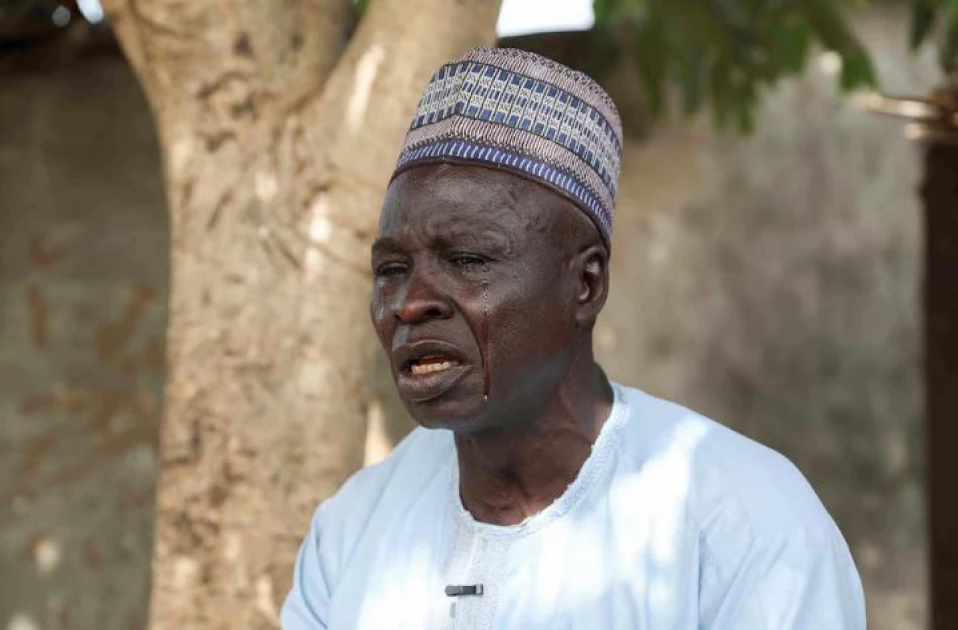A decade on, tragedy of Nigeria's Chibok Girls endures outside the spotlight

Solomon Maina, father of Debora, one of the 276 schoolgirls kidnapped from their dormitory by Boko Haram Islamist militants in 2014, reacts as he speaks during an interview with Reuters, at his home in Chibok, Nigeria April 7, 2024. REUTERS/Temilade Adelaja

Audio By Vocalize
Ten years ago, Solomon Maina's daughter, Debora, was one of 276 schoolgirls kidnapped from their dormitory in the middle of the night by Nigeria's Boko Haram Islamist militants.
Global outrage was swift. A ubiquitous "Bring Back Our Girls" campaign, drawing support from the likes of Michelle Obama and Sylvester Stallone, shined a spotlight on the abductions.
Then, in 2016 and 2017, negotiations led to the highly publicised liberation of around 100 of the captives.
A decade after that fateful night in April 2014, the world has largely forgotten the plight of the so-called Chibok girls. But for the victims and their families, the tragedy is ongoing.
"Especially at night, I think about my daughter," Maina, in tears, told Reuters in an interview at his home in Chibok, a Christian enclave in the West African nation's majority Muslim north. "I will never forget her."
Abductees who have returned home have struggled to resume their interrupted lives. Some are raising children fathered by their captors.
Others have waited years for funds promised by the government to continue their education.
Those who spent the longest time in captivity have often had the most difficulty reintegrating with civilian life.
Dozens freed only in the past few years are living inside a military-run rehabilitation camp with surrendered Boko Haram fighters they married in the bush, according to the Murtala Muhammed Foundation, a charity that advocates for them. With them are more than 30 children.
"I'm tired of staying in the camp," one Chibok survivor told Reuters, asking not to be identified for fear of reprisals by the military. "I want to go home and stay with my family. There is no place like home."
Three of the surviving women told Reuters that in at least five cases women who arrived at the camp unmarried have been married to surrendered fighters once there.
Government officials have officiated over such weddings, in an apparent effort to appease the surrendered fighters, family members say.
Aid groups and relatives say there is no clarity surrounding when - or even if - the women in the camp will be allowed to return home.
"They were brainwashed and their psychological thinking and mindset were changed to favour their abductors," said Dauda Yama whose daughter is inside the camp.
The state official in charge of the rehabilitation project did not respond to a Reuters request for comment.
Roughly 90 Chibok girls are still missing. Based on the accounts of former abductees, the Murtala Muhammed Foundation believes a third of those have died in captivity.
"Some died of childbirth, some of starvation or snakebite others in government air strikes" against Boko Haram, said Aisha Muhammed-Oyebode, the foundation's head. A parents association for the Chibok girls also estimates dozens are now dead.
Nigeria's president's office and the interior ministry did not respond to requests for comment on how many of the missing Chibok girls were believed to still be alive.
Early on, as the girls began emerging from captivity in the bush and their fate was still a rallying cause around the world, the government pledged to fund their studies in "any field of their choice."
Some liberated captives are attending universities as far afield as the United States. But some say the assistance never arrived.
Yagana Yamani waited for government funds for six years after escaping her captors. She finally asked her mother, a farmer, to help. Now 25, she is studying public health.
"They didn't fulfil their promise," she said.
The federal government did not respond to requests for comment on the question of whether it failed to provide promised support.
Nigeria's military has been fighting Boko Haram since 2009 in a conflict that killed tens of thousands of people and displaced more than 2 million.
While the group aims to topple Nigeria's government to establish a state based on its own interpretation of Islamic law, to many people around the world it is best known for the Chibok kidnapping.
Soon after the raid, then-President Goodluck Jonathan promised that the girls would be brought home. Solomon Maina feels he is alone grappling with his daughter's fate.
Through a freed abductee, he learned that Debora had been injured but survived a bombing raid on Boko Haram. He believes she's still out there, alive.
"Where is she now? Is she in a comfortable place?" he said.
"I think about this all the time."


Leave a Comment